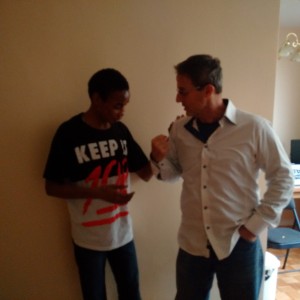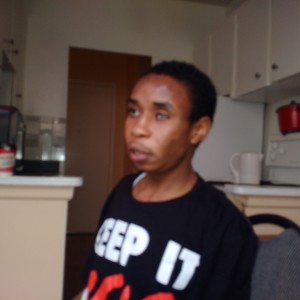To read The Gift of Ishag Ahmed (Part one) click here
“Can I tell you something?” he asked her. “Of course,” she says.
“When I dream, I dream all kinds of things in full colour. It’s very real to me and I like it. It’s just that when I wake up, the dream ends and there are no more colours. When I open my eyes, everything is black. It kind of scares me.”
Michelle’s cool reserve crumples. She’s been the problem-solving nurturer thus far but this has left her speechless. “Oh, Ishaq,” she says, remaining stoic for his sake. But perhaps she thinks: dammit, he’s going to wake up every day comfortable if I can help it.
It is late 2015. I’ve kept in touch with Ishaq through the odd phone call and Facebook (where for a while his handle was Dark Kingdom. What a card).
Mel and I had a Christmas party to attend in Toronto one night recently and we would be staying over at her sister’s place near the airport, since it would have been too far from our place in Cobourg to drive home. With our kids in tow, and before driving back, we went to visit Ishaq on a Sunday afternoon.
When we first got to his apartment, there was a pair of Jehovah’s Witness visiting. I teased them about getting extra points for converting a Muslim. I knew Ishaq wasn’t particularly devout. They took my ribbing good-naturedly; indeed, decent guys with seemingly the best of intentions.
They soon excused themselves so we could visit.
It turns out in the intervening years Ishaq had lived in Vancouver for a year while studying as an audio engineer. He continued his interest in percussion and had become good at making his own music electronically.
Then, there was three-month trip to Africa to meet the rest of his family. His mother and father were long divorced, not on good terms. All by himself, he traveled there and back. After some initial reluctance, his maternal grandmother intervened for her grandson to arrange a visit with his father. He showed up one day at her place in Khartoum with several of Ishaq’s half-siblings. They all knew about their blind brother in Canada; he knew nothing of them.
You can imagine living a life of darkness, knowing these visitors are actual blood relatives would be comforting. They represent a connection between the fading memories of his former life and his present existence. His father and siblings are a kind of mental salve for the yearning to recapture stray hints of his sighted life, glimpses he carries with him every day, precariously fading with time.
It’s just that losing his sight at nine years old means that he has scant few years of sight upon which to base mental reconstructions. If our first recall appears at age three or four, he had five or so years to frame everything that followed. His is a life permanently seen through the eyes of a child.
He remembers his father fondly. Once, dad brought his young son a bike that was much too big for him to ride. It was placed in the back shed behind the house until such time as he might grow big enough. He never did get to do that. Mom sold it after the breakup. The thought, the very impossible possibility of riding that bike someday remains with him still.
He misses his father. Though he loves his mother, he yearns for the company and approval of the man who is half his ancestral link. Together, we blamed his father for his absence; and then, for the memory of how he brought him that bike.
We held him responsible for the kindness and love Ishaq felt during some of his fondest years. Smiling, we put the onus squarely on his father for some of Ishaq’s physical characteristics: his long slender fingers and large hands that are seemingly made for drums and keyboard. We chuckled as we faulted him for the long spindly legs that are a constant reminder to his mother that he is his father’s son. Especially, we blamed his father and the serendipitous universe that gave Ishaq life.
Since November, Ishaq is holed up in a little one bedroom at Jane and Sheppard, in a tidy but older building where he lives in the basement. It’s not an ideal place, and it’s not the greatest part of town. When he got here, he moved in temporarily with friends, enrolling in school, taking out loans to attend another radio course at Ryerson College. Eventually, couch surfing wouldn’t do.
He had found living at his mother’s in Calgary constricting. To her, he’d always be her tiny boy, helpless and confined. He needed to stand on his own, as a man, independent and willing to take risks. He decided on the challenge pursuing an education in another city might bring. He had put it all on the line moving here.
Though, at times, I’m sure he’s felt as if he may have bitten off more than he can chew in the pursuit of his freedom. He’s not the kind to dwell on his plight anyway. My friend Ishaq is no victim.
Besides Witness Victor’s gifted table and four folding chairs, Ishaq’s apartment was devoid of furniture. My kids ran around the empty rooms. It was perfect for them– nothing to break.
A former neighbour had foisted an old TV on him as he was moving out, too lazy to dispose of it himself. It sat decrepit, covered with decades of filth and useless in the living room. Ishaq thought visitors might watch it when he good naturedly accepted his neighbour’s benevolence. It wouldn’t even turn on.
There were no curtains on the windows and Ishaq expressed concern that people could see in at night when he was alone. I resisted mentioning that no one would be able to see in if the lights weren’t on. The timing wasn’t right; it was his security he was worried about.
He has a tiny kitchen, which I thought was perfect for him, but not much food. You could tell he wasn’t eating much of anything. He could reach from the sink to the fridge and stove and each of his five cupboards, all at arm’s length away. He lacked the variety of the kinds of easily prepared foodstuffs he needed to eat consistently and stay healthy. I tossed a head of rotting romaine lettuce into the garbage.
He couldn’t be more than 120 pounds (later I found out he was 109). Though taller than he was when he first worked for me, he was essentially the same Ishaq, but a cooler kid now. No. A young man, and with an extra sophistication that warmed me. It’s always nice to see how one of my charges has grown many years later.
Eventually, we got him to show us his bedroom. “I was so glad to finally get this mattress, oh boy,” he said. You could tell he had slept on the floor at first. Even blind, the relief on his face was easy to see as he mentioned his bed. It was an air mattress, fully inflated, hard, as they get when fully filled. It was Victor who had brought it recently. However, it had no bedding, blankets, or pillows. Again, the window had no curtains, though there was a curtain rod on the sill awaiting installation.
In the corner was a set of drums. These were a far cry from the bongo drums I promised to buy him back in the door to door days. He had to write 30 orders in a week to earn them at the time. The last day he was on track and started to fool around, finishing with just 29. I struggled whether to make an exception and get them for him anyway. In the end, I knew that wasn’t the right thing to do. No drums for you little buddy. Here he was now, with real drums. A man’s drums.
He’d graduated to full-fledged stand up congas, the kind you see professional musicians play all over Latin America and beyond. I asked him to demonstrate what he’d learned. Still standing wobbly on the air mattress, and not even in front of the unit, he immediately launched into a solo session that had both my kids dancing and wiggling their butts.
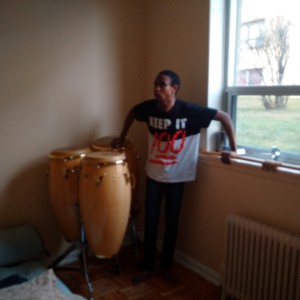
Rhythm hasn’t left him a bit. Only, he’s much better. It almost seems to be as if his fingers have gotten longer, the digits like little hammers on bass drum sticks attached to his hands. He can tap out with one hand what I can’t even manage with two, never mind the speed or timing of his beat. He said he hasn’t practiced much lately, with a resigned sound to his words that I noted.
I remember he used to be able to read the Braille writing on our Canadian paper money. I motioned to the missus, the keeper of the purse, to hand me some. Mel hands me a ten. I ask for more. She gives me a twenty. Again, I motion to her. Out comes a hundred. This is uncharacteristic for my gal Mel, though I wasn’t surprised knowing how she felt about Ishaq.
Could he read the Braille on the bill? He’s reluctant so I throw in incentive, so he’ll feel he’s earned it. I tell Ishaq to read that one and I’ll let him keep it. He says it’s a ten. Uh-oh. So I showed him the difference. I pointed out with the benefit of eyesight guiding my expertise, on the hundred the space between the sets of six dots is a couple of inches, on the ten, maybe half an inch.
I stuff it in his pocket anyway, thereby relieving myself of years of guilt over his bongo bonus. I looked at Mel: she didn’t flinch.
To change the subject, I announce that we’re going out to eat. I have forty Big Mac coupons and there’s a restaurant down the street. I get them as part of buying gift cards for my newspaper customers to use as inducements. Off we go to McDonalds to feed our friend. I was thinking if he could get to McDonalds, I could leave him the free coupons and at least he wouldn’t starve for a month or so.
Before we go out, I show him how to turn down the heat on his radiator in the living room by closing the valve: must have been a hundred in there. I take his hand and run it along the rad to the tap handle down by the floor on the left so he’ll know where to find it later. The place had been recently painted and the lingering smell was suffocating in the heat. He kept the windows open, shutting them only when going out for security. He needs an ozone machine in there to kill the overpowering smell molecules, I think.
At McDonalds, they accepted my coupons but told us they’d only do it this one time. Apparently, I had to use them at a specific location or something. He’d be fed for the day at least. Truth is that the McDonalds is a couple of blocks away on the other side of the highway underpass and on the other side of busy Jane Street to boot. Traveling by cane there every day might have been asking too much.
Next stop: the grocery store. I decided to get him some essentials he can easily fix for himself. Mel and the kids wait in the car while Ishaq and I hunt for stuff in the store. All the sight gag lines return. “You check your side of the aisle for mayonnaise and I’ll check mine,” he says. At the till, I get the cashier to break Ishaq’s hundred dollar bill into twenties, just in case.
Here’s a kid who doesn’t know anyone in Toronto, all alone and blind in Canada’s largest metropolis. He can’t just walk anywhere; he has to first spend time memorizing any route. Even so, he takes the bus and trains to school every day. There, he’s an exemplary student and passes everything.
The cataract that was just beginning to appear in his left eye back when he first worked for me has expanded to several. I once asked him about wearing sunglasses, Stevie Wonder style, and he refused. I notice that he wears them now, if only so he doesn’t freak people out. He’ll lose that left eye at some point. He talked about putting in a half glass eye as if we were discussing buying a watch.
He needs people. He needs to connect with those in the community who can lend a hand to this proud young man. They say a community is only as good as it takes care of its vulnerable. He’s a sweet and tender soul with the heart of a lion. It was hard to leave him. I could tell he was lonely. I think to myself: no one has Jehovah’s Witnesses into their apartment that easily.
On that Sunday afternoon, I was desperately trying to think of how I could plug him into others, though I live 150 kilometers away. He likely wouldn’t go through all the song and dance of filling out forms, determining eligibility and being put on a waiting list, all to satisfy some helping bureaucracy he’s never relied on before. No. Ishaq would suffer on, rather than go through all that.
Unless he could somehow be discovered by good people who wouldn’t mind visiting, I thought to myself. He needs eyes, the eyes of friendship. Only by creating some kind of network of support would he stand a chance of being able to chase his dreams of living a great adventure in Canada’s largest city.
I wondered if I could find one person to get the ball rolling. I needed someone fast and capable, someone I could trust completely to do right by my friend. I needed someone with empathy, with a heart as big as his. I needed a wonderful giver who has a talent for problem solving.
I called Mel’s sister Michelle on the way home, crossing my fingers.
She lives near the airport and is ten minutes away from Ishaq’s if there’s no traffic. Michelle is the gal I keep advertising on my Facebook wall to eligible bachelors, drawing the ire of feminists in the process. I do it to signal how much she’s appreciated, and she gets a real chuckle out of it. She can cook a meal just as well as she can swing a hammer. Without hesitation, Michelle agreed to visit Ishaq.
I sent her pictures of his empty place. She arrived the next day much to my relief. She brought friends. Michelle is like that, a natural networker. She can nurture people like they were her own. My kids love her. We all love Michelle.
He now has a big comfy chair with attached ottoman, suitable for taking naps, thanks to Michelle and her co-worker. It was the first soft thing he’d sat on in months. She brought him bedding–he’d been sleeping under his amassed clothing. They’ve become good friends. He confides to her his challenges. She listens and helps.
She suggested brown as a colour for drapes. He told her he’s trying to remember what brown looks like again. She’s taken him to Value Village to get new used clothes. He’s got a coffee maker now. Michelle loves to shop, especially for a deal. They’re perfectly matched. She visits often, texts even more. He’s her little brother now, and under her protection.
Michelle took Ishaq to Dundas Square for New Year’s Eve music and celebrations. Instead of her hanging on to the arm of a date, Ishaq held her elbow as she guided him through the crowds. They watched and listened to fireworks explode between the twin buildings of our city hall. They took pictures, and selfies.
At the subway returning home, security held everyone back and ensured they embarked first. The white cane has power.
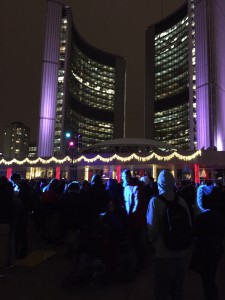
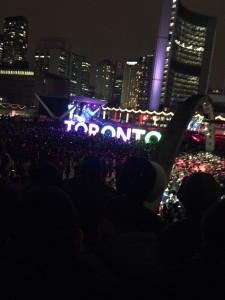
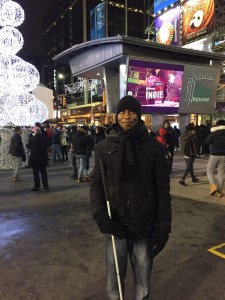
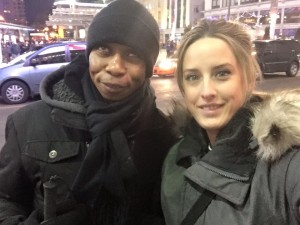
Michelle has introduced her new friend to others. They’re curious about this blind kid with the great attitude. One evening she and a friend sat in Ishaq’s apartment talking together into the night. They kept the lights off, immersing themselves in his experience.
This same person mentioned his visit to his friends, one of whom suddenly mentioned he had some “extra money,” insisting it go to Ishaq. That paid off Ishaq’s credit card.
Dumbfounded, Ishaq is a bit embarrassed when Michelle’s friends pick him up. He does his best to flirt with the store staff and make everyone laugh. As he accepts his conditions, being relaxed about being blind, those around him accept their own limitations, not as limitations, but as qualities worth sharing. By simply being Ishaq, he teaches self-acceptance.
I remember hearing Candy Palmater on CBC radio one evening. Candy is a famous Canadian Mi’kMaq native and comedian. She was talking about her nervousness at doing stand-up in front of her peers at the Assembly of First Nations. She told of how native elders had told her that if something is your gift, it’s what you owe.
Not yours to exploit, but what you owe. To me, this meant that our lives exist for others even more than they do for ourselves, and that we are obligated to bring our strengths and talents to our community. Call it a pact with the universe.
Though he may feel a bit awkward about how others are so curious about his blindness, something he’s made normal after more than a decade and a half, he’s there to share his life. For absent this purpose is aimlessness, confusion, existential uncertainty and intolerable loneliness.
Every time someone meets this self-effacing blind man, they are struck by his courage and perseverance. He serves as inspiration. Of course, I don’t tell him that quite in those words. Instead, I suggest he’s performing a public service by being an ambassador for the blind.
He admits it feels good to be useful. Instead of being cooped up in his tiny apartment, he’s sharing, and allowing others to share with him. This opens the door to more sharing. In my heart I hope he’s ricocheting through an ever expanding network of people in one of the greatest cities on earth. Toronto the good, it’s sometimes called.
Ishaq’s special talent is that he gives permission to those who encounter him to share their gifts. You are compelled to feel an overwhelming gratitude once the magnitude of his challenges is understood. He reminds us of how much we need each other, and how easy it can be to give a helping hand to another.
One single person can make all the difference. One act of kindness by someone like Michelle can reveal a whole new world to a blind kid living alone on the edge of Toronto’s ghetto. Like a web of goodness, that influence has spread beyond and continues to expand, tying its members together in mutual empowerment.
Most of all, Ishaq’s hopefulness has given way to possibility. Without hope, life stops in place. Without hope the idea of confidence becomes an insurmountable obstacle to living a life of possibility. Thoughts remain thoughts, never approaching execution. Hope is contagious. That’s the gift of Ishaq Ahmed.
“Perfumes are my thing,” he says. “I can take a smell and make dreams with it.”
Forever hopeful.
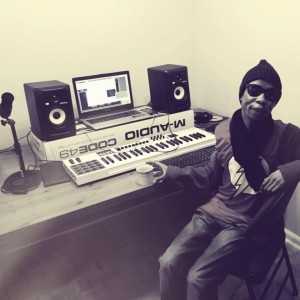
© C K Wallace 2016
@ckwallace.com
